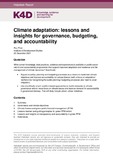| dc.contributor.author | Price, Roz | |
| dc.date.accessioned | 2022-02-08T15:08:51Z | |
| dc.date.available | 2022-02-08T15:08:51Z | |
| dc.date.issued | 2020-12-20 | |
| dc.identifier.citation | Price, R.A. (2021). Climate adaptation: lessons and insights for governance, budgeting, and accountability. K4D Helpdesk Report 1073. Institute of Development Studies, DOI: 10.19088/K4D.2022.008 | en |
| dc.identifier.uri | https://opendocs.ids.ac.uk/opendocs/handle/20.500.12413/17150 | |
| dc.description.abstract | This rapid review draws on literature from academic, policy and non-governmental organisation sources. There is a huge literature on climate governance issues in general, but less is known about effective support and the political-economy of adaptation. A large literature base and case studies on climate finance accountability and budgeting in governments is nascent and growing.
Section 2 of this report briefly discusses governance of climate change issues, with a focus on the complexity and cross-cutting nature of climate change compared to the often static organisational landscape of government structured along sectoral lines. Section 3 explores green public financial management (PFM). Section 4 then brings together several principles and lessons learned on green PFM highlighted in the guidance notes. Transparency and accountability lessons are then highlighted in Section 5. The Key findings are: 1) Engaging with the governance context and the political economy of climate governance and financing is crucial to climate objectives being realised.
2) More attention is needed on whether and how governments are prioritising adaptation and resilience in their own operations.
3) Countries in Africa further along in the green PFM agenda give accounts of reform approaches that are gradual, iterative and context-specific, building on existing PFM systems and their functionality.
4) A well-functioning “accountability ecosystem” is needed in which state and non-state accountability actors engage with one another.
5) Climate change finance accountability systems and ecosystems in countries are at best emerging.
6) Although case studies from Nepal, the Philippines and Bangladesh are commonly cited in the literature and are seen as some of the most advanced developing country examples of green PFM, none of the countries have had significant examples of collaboration and engagement between actors.
7) Lessons and guiding principles for green PFM reform include: use the existing budget cycle and legal frameworks; ensure that the basic elements of a functional PFM system are in place; strong leadership of the Ministry of Finance (MoF) and clear linkages with the overall PFM reform agenda are needed; smart sequencing of reforms; real political ownership and clearly defined roles and responsibilities; and good communication to stakeholders). | en |
| dc.description.sponsorship | FCDO (Foreign, Commonwealth and Development Office) | en |
| dc.language.iso | en | en |
| dc.publisher | Institute of Development Studies | en |
| dc.relation.ispartofseries | K4D Helpdesk Report;1073 | |
| dc.rights.uri | https://www.nationalarchives.gov.uk/doc/open-government-licence/version/3/ | en |
| dc.subject | Climate Change | en |
| dc.title | Climate Adaptation: Lessons and Insights for Governance, Budgeting, and Accountability | en |
| dc.type | Helpdesk | en |
| dc.rights.holder | © Crown copyright 2022 | en |
| dc.identifier.doi | 10.19088/K4D.2022.008 | |
| rioxxterms.funder | Default funder | en |
| rioxxterms.identifier.project | K4D | en |
| rioxxterms.version | VoR | en |
| rioxxterms.versionofrecord | 10.19088/K4D.2022.008 | en |
| rioxxterms.funder.project | 0986883a-6d0f-4bb8-9c46-5e0682934d65 | en |

